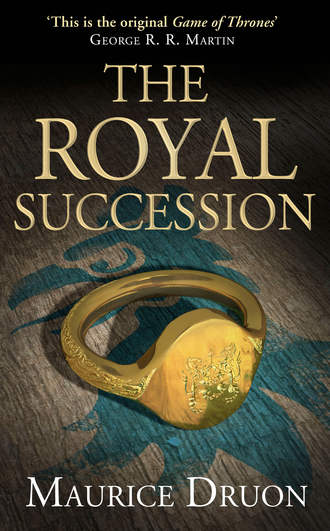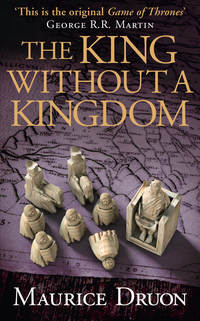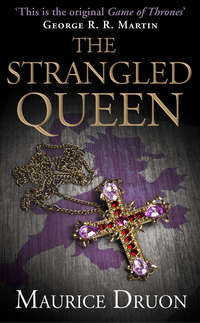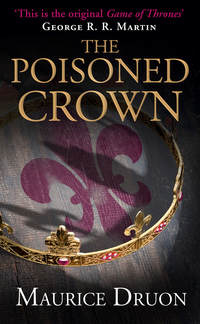
Полная версия
The Royal Succession
For the last hour Valois had been trying to persuade Clémence to return to the Palace of the Cité, because he had decided to go there himself. It formed part of his plan for assuming the regency and facing the Council of Peers with the accomplished fact. Whoever was master in the Palace had the trappings of power. But to install himself there on his own might look as if he were usurping it by force. If, on the other hand, he entered the Cité in his niece’s wake, as her nearest relative and protector, no one could oppose it. The Queen’s condition was, at this moment, the best pledge of respect and the most effective instrument of government.
Clémence turned her head, as if to ask for help, towards a third person who was standing silently a few paces from her, his hands crossed on the hilt of a long sword, as he listened to the conversation.
‘Bouville, what should I do?’ she murmured.
Hugues de Bouville, ex-Grand Chamberlain to Philip the Fair, had been appointed Curator of the Stomach by the first Council which had followed on the death of the Hutin. This good man, now growing stout and grey, but still extremely alert, who had been an exemplary royal servant for thirty years, took his new duties most seriously, if not tragically. He had formed a corps of carefully picked gentlemen, who mounted guard in detachments of twenty-four over the Queen’s door. He himself had donned his armour and, in the heat of June, large drops of sweat were running down under his coat of mail. The walls, the courtyards, indeed the whole perimeter of Vincennes, were stuffed with archers. Every kitchen-hand was constantly escorted by a sergeant-at-arms. Even the ladies-in-waiting were searched before entering the royal apartments. Never had a human life been guarded so closely as that which slumbered in the womb of the Queen of France.
In theory Bouville shared his duties with the old Sire de Joinville, who had been appointed Second Curator; the latter had been selected because he happened to be in Paris where he had come to draw, as he did twice a year, with the fussy punctuality of an old man, the income from the endowments conferred on him in three successive reigns, and in particular when Saint Louis was canonized. But the Hereditary Seneschal of Champagne was now ninety-two years old; he was practically the doyen of the high French nobility. He was half-blind and this last journey from his Château de Wassy in the Haute-Marne had tired him out. He spent most of his time dozing in the company of his two white-bearded equerries, so that all the duties had to be performed by Bouville alone.
For Queen Clémence, Bouville was linked with all her happiest memories. He had been the ambassador who had come to ask her hand in marriage and had escorted her from Naples; he was her utterly devoted confidant and probably the only true friend she had at the French Court. Bouville had perfectly understood that Clémence did not wish to leave Vincennes.
‘Monseigneur,’ he said to Valois, ‘I can better assure the safety of the Queen in this manor with its close, surrounding walls than in the great Palace of the Cité, open to all comers. And if you are worried about the Countess Mahaut being near, I can inform you, for I am kept in touch with everything that goes on in the neighbourhood, that Madame Mahaut’s wagons are at this moment being loaded for Paris.’
Valois was considerably annoyed by the air of importance Bouville had assumed since he had become Curator, and by his insistence on remaining there, stuck to his sword, by the Queen’s side.
‘Monsieur Hugues,’ he said haughtily, ‘your duty is to watch over the stomach, not to decide where the royal family shall reside, nor to defend the whole kingdom on your own.’
Not in the least perturbed, Bouville replied: ‘I must also remind you, Monseigneur, that the Queen cannot appear in public until forty days have elapsed since her bereavement.’
‘I know the custom as well as you do, my good man! Who said that the Queen would show herself in public? She shall travel in a closed coach. Really, Niece,’ Valois cried, turning to Clémence, ‘anyone would think that I was trying to send you to the country of the Great Khan, and that Vincennes was two thousand leagues from Paris!’
‘You must understand, Uncle,’ Clémence replied weakly, ‘that living at Vincennes is my last gift from Louis. He gave me this house, in there, and you were present’ – she fluttered her hand towards the room in which Louis X had died – ‘that I might live in it. It seems to me that he has not really departed. You must understand that it’s here that we had …’
But Monseigneur of Valois could not understand the claims of memory or the imaginings of sorrow.
‘Your husband, for whom we pray, my dear Niece, belongs henceforth to the kingdom’s past. But you carry its future. By exposing your life, you expose that of your child. Louis, who sees you from on high, would never forgive you.’
The shot went home, and Clémence sank back in her chair without another word.
But Bouville declared that he could decide nothing without the agreement of the Sire de Joinville, and sent someone to look for him. They waited several minutes. Then the door opened, and they waited again. At last, dressed in a long robe such as had been worn at the time of the Crusade, trembling in every limb, his skin mottled and like the bark of a tree, his eyes with their faded irises watering, Saint Louis’s last companion-at-arms entered, dragging his feet, supported by his equerries, who tottered almost as much as he did. He was given a seat with all the respect to which he was entitled, and Valois began to explain his intentions about the Queen. The old man listened, solemnly nodding his head, obviously delighted still to have some part to play. When Valois had finished, the Seneschal fell into a meditation they were careful not to disturb; they waited for the oracle to speak. Suddenly he asked: ‘But where is the King then?’
Valois looked crestfallen. So much useless trouble, and when time pressed! Did the Seneschal still understand what was said to him?
‘But the King is dead, Messire de Joinville,’ he replied, ‘and we buried him this morning. You know that you have been appointed Curator.’
The Seneschal frowned and seemed to be making a great effort to recollect. Indeed, failure of memory was no new thing with him; when he was nearly eighty and dictating his famous Memoirs, he had not realized that towards the end of the second part he was repeating almost word for word what he had already said in the first.
‘Yes, our young Sire Louis,’ he said at last. ‘He is dead. It was to himself that I presented my great book. Do you know that this is the fourth king I have seen die?’
He announced this as if it were an exploit in itself.
‘Then, if the King is dead, the Queen is Regent,’ he declared.
Monseigneur of Valois turned purple in the face. He had had appointed as Curators a senile idiot and a mediocrity, believing he could manage them as he wished; but he was hoist with his own petard, for it was they who were creating his worst difficulties.
‘The Queen is not Regent, Messire Seneschal; she is pregnant,’ he cried. ‘She cannot in any circumstances be Regent until it is known whether she will give birth to a king! Look at her condition, see if she is in a fit state to carry out the duties of the kingdom!’
‘You know that I see very little,’ replied the old man.
With her hand to her forehead, Clémence merely thought: ‘When will they stop? When will they leave me in peace?’
Joinville began explaining in what circumstances, after the death of King Louis VIII, Queen Blanche of Castile had assumed the regency, to the satisfaction of all.
‘Madame Blanche of Castile, and this was only whispered, was not as pure as the image that has been created of her. It appears that Count Thibaut of Champagne, who was a good friend of Messire my father’s, served her even in her bed …’
They had to let him talk. Though the Seneschal easily forgot what had happened the day before, he had a precise memory for the things he had been told as a small child. He had found an audience and was making the most of it. His hands, shaking with a senile trembling, clawed unceasingly at the silk of his robe over his knees.
‘And even when our sainted King left for the Crusade, where I was with him …’
‘The Queen resided in Paris during that time, did she not?’ interjected Charles of Valois.
‘Yes, yes …’ said the Seneschal.
Clémence was the first to give way.
‘Very well, Uncle, so be it!’ she said. ‘I will do as you wish and return to the Cité.’
‘Ah! A wise decision at last, which I am sure Messire de Joinville approves.’
‘Yes, yes …’
‘I shall go and take the necessary measures. Your escort will be under the command of my son, Philippe, and our cousin, Robert of Artois.’
‘Thank you, Uncle, thank you,’ said Clémence, on the verge of collapse. ‘But now, I ask you, please, let me pray.’
An hour later, the Count of Valois’s orders had set the Château of Vincennes in turmoil. Wagons were being brought out of the coach-house; whips were cracking on the cruppers of the great Percheron horses; servants were running to and fro; the archers had laid down their weapons to lend a hand to the stablemen. Since the King’s death they had all felt they should talk in low voices, but now everyone found an occasion to shout; and, if anyone had really wished to make an attempt on the Queen’s life, this would have been the very moment to choose.
Within the manor the upholsterers were taking down the hangings, removing the furniture, carrying out tables, dressers and chests. The officers of the Queen’s household and the ladies-in-waiting were busy packing. There was to be a first convoy of twenty vehicles, and doubtless they would have to make two journeys to complete the move.
Clémence of Hungary, in the long white robe to which she was not yet accustomed, went from room to room, escorted always by Bouville. There were dust, sweat and tumult everywhere, and that sense of pillage that goes with moving house. The Bursar, inventory in hand, was superintending the dispatch of the plate and valuables which had been collected together and now covered the whole floor of a room: dishes, ewers, the dozen silver-gilt goblets Louis had had made for Clémence, the great gold reliquary containing a fragment of the True Cross, which was so heavy that the man carrying it staggered as if he were on his way to Calvary.
In the Queen’s chamber the first linen-maid, Eudeline, who had been the mistress of Louis X before his marriage to Marguerite, was in charge of packing the clothes.
‘What is the use of taking all these dresses, since they will never be of any use to me again?’ said Clémence.
And the jewels too, packed in heavy iron chests, the brooches, rings and precious stones Louis had lavished on her during the brief period of their marriage, were all henceforth useless objects. Even the three crowns, laden with emeralds, rubies and pearls, were too high and too ornate for a widow to wear. A simple circlet of gold with short lilies, placed over her veil, would be the only jewel to which she would ever have a right.
‘I have become a white Queen, as I saw my grandmother, Marie of Hungary, become,’ she thought. ‘But my grandmother was over sixty and had borne thirteen children. My husband will never even see his.’
‘Madame,’ asked Eudeline, ‘am I to come with you to the Palace? No one has given me orders.’
Clémence looked at the beautiful, fair woman who, forgetting all jealousy, had been of such great help to her during the last months and particularly during Louis’s illness. ‘He had a child by her, and he banished her, shut her up in a nunnery. Is that why Heaven has punished us?’ She felt laden with all the sins Louis had committed before he knew her, and that she was destined to redeem them by her suffering. She would have her whole life in which to pay God, with her tears, her prayers and her charity, the heavy price for Louis’s soul.
‘No,’ she murmured, ‘no, Eudeline, don’t come with me. Someone who loved him must remain here.’
Then, dismissing even Bouville, she took refuge in the only quiet room, the only room left undisturbed, the chamber in which her husband had died.
It was dark behind the drawn curtains. Clémence went and knelt by the bed, placing her lips against the brocade coverlet.
Suddenly she heard a nail scratching against cloth. She felt a terror which proved to her that she still had a will to live. For a moment she remained still, holding her breath, while the scratching went on behind her. Warily she turned her head. It was the Seneschal de Joinville, who had been put in a corner of the room to wait till it was time to leave.
2
The Cardinal who Did not Believe in Hell

THE JUNE NIGHT WAS beginning to grow pale; already in the east a thin grey streak low in the sky was the harbinger of the sun, soon to rise over the city of Lyons.
It was the hour when the wagons set out for the city, bringing fruit and vegetables from the neighbouring countryside; the hour when the owls fell silent and the sparrows had not yet begun to twitter. It was also the hour when Cardinal Jacques Duèze, behind the narrow windows of one of the apartments of honour in the Abbey of Ainay, thought about death.
The Cardinal had never had much need of sleep; and as he grew older he needed still less. Three hours of sleep were quite enough. A little after midnight he rose and sat at his desk. A man of quick intellect and prodigious knowledge, trained in all the intellectual disciplines, he had composed treatises on theology, law, medicine and alchemy which carried weight among the scholars and savants of his time.
In this period, when the great hope of poor and princes alike was the manufacture of gold, Duèze’s doctrines on the elixirs for the transmutation of metals were much referred to.
‘The materials from which elixirs can be made are three,’ could be read in his work entitled The Philosophers’ Elixir, ‘the seven metals, the seven spirits and other things … The seven metals are sun, moon, copper, tin, lead, iron, and quicksilver; the seven spirits are quicksilver, sulphur, sal-ammoniac, orpiment, tutty, magnesia, marcasite; and the other things are quicksilver, human blood, horses’s blood and urine, and human urine.’2
At seventy-two the Cardinal was still finding fields in which he had not given his thought expression, and was completing his work while others slept. He used as many candles as a whole community of monks.
During the nights he also worked at the huge correspondence which he maintained with numerous prelates, abbots, jurists, scholars, chancellors and sovereign princes all over Europe. His secretary and his copyists found their whole day’s work ready for them in the morning.
Or again, he might consider the horoscope of one of his rivals in the Conclave, comparing it to his own sky, and asking the planets whether he would don the tiara. According to the stars, his greatest chance of becoming Pope was between the beginning of August and the beginning of September of the present year. And now it was already the 10th of June and nothing seemed to be shaping to that end.
Then came that painful moment before the dawn. As if he had a premonition that he would leave the world precisely at that hour, the Cardinal felt a sort of diffused distress, a vague unease both of body and of mind. In his fatigue he questioned his past actions. His memories were of an extraordinary destiny. A member of a family of burgesses of Cahors, and still completely unknown at an age at which most men in those times had already made their career, his life seemed to have begun only at forty-four, when he had left suddenly for Naples in the company of an uncle, who was going there on business. The voyage, being away from home, the discovery of Italy, had had a curious effect on him. A few days after landing, he had become the pupil of the tutor to the royal children and had thrown himself into abstract study with a passion, a frenzy, a quickness of comprehension and a precision of memory which the most intelligent adolescent might have envied. He was no more subject to hunger than he was to the need for sleep. A piece of bread had often sufficed him for a whole day, and prison life would have been perfectly agreeable to him provided he had been furnished with books. He had soon become a doctor of canon law, then a doctor of civil law, and his name had begun to be known. The Court of Naples sought the advice of the cleric from Cahors.
This thirst for knowledge was succeeded by a thirst for power. Councillor to King Charles II of Anjou-Sicily (the grandfather of Queen Clémence), then Secretary to the Secret Councils and the holder of numerous ecclesiastical benefices, he had been appointed Bishop of Fréjus ten years after his arrival, and a little later succeeded to the post of Chancellor of the kingdom of Naples, that is to say, first minister of a state which included both southern Italy and the whole county of Provence.
So fabulous a rise among the intrigues of courts had not been accomplished merely with the talents of a jurist or a theologian. An event known to but few people, since it was a secret of the Church, shows the cunning and impudence of which Duèze was capable.
A few months after the death of Charles II he had been sent on a mission to the Papal Court, at a time when the bishopric of Avignon – the most important in Christendom because it was the seat of the Holy See – happened to be vacant. Still Chancellor, and therefore the repository of the seals, he disingenuously wrote a letter in which the new King of Naples, Robert, asked for the episcopate of Avignon for Jacques Duèze. This he did in 1310. Clement V, anxious to acquire the support of Naples at a time when his relations with Philip the Fair were somewhat uneasy, had immediately acceded to the request. The fraud was discovered only when Pope Clement and King Robert met with mutual surprise, the first because he had received no thanks for so great a favour, the second because he considered the unexpected appointment, which deprived him of his Chancellor, somewhat cavalier. But it was too late. Rather than create useless scandal, King Robert turned a blind eye, preferring to keep a hold over a man who was to occupy one of the highest of ecclesiastical positions. Each had done well out of it. And now Duèze was Cardinal in Curia, and his works were studied in every university.
Yet, however astonishing his career might be, it appeared so only to those who looked on it from the outside. Days lived, whether full or empty, whether busy or serene, are but days gone by, and the ashes of the past weigh the same in every hand.
Had so much activity, ambition and expended energy any meaning, when it must all inevitably end in that Beyond of which the greatest intellects and the most abstruse of human sciences could glimpse no more than indecipherable fragments? Why should he wish to become Pope? Would it not have been wiser to retire to a cloister in detachment from the world; lay aside the pride of knowledge and the vanity of power; and acquire the humility of simple faith in order to prepare himself for death? But even meditating thus, Cardinal Duèze turned perforce to abstract speculation; and his concern with death became transformed into a juridical argument with the Deity.
‘The doctors assure us,’ he thought that morning, ‘that the souls of the just, immediately after death, enjoy the beatific vision of God, which is their recompense. So be it, so be it. But after the end of the world, when the bodies of the dead have risen again to rejoin their souls, we are to be judged at the Last Judgment. Yet God, who is perfect, cannot sit in appeal on His own judgments. God cannot commit a mistake and be thereby compelled to cast out of Paradise the elect He has admitted already. Moreover, would it not be proper for the soul to enter into possession of the joy of the Lord only at the moment when, reunited with its body, it is itself in its nature perfect? Therefore the doctors must be wrong. Therefore there cannot be either beatitude, as such, nor the beatific vision before the end of time, and God will permit Himself to be looked on only after the Last Judgment. But, till then, where are the souls of the dead? Do we wait perhaps sub altare Dei, beneath that altar of God of which Saint John the Divine speaks in his Apocalypse?’
The noise of horses’ hooves, a most unusual sound at that hour, echoed along the abbey walls and across the little round cobbles with which the best streets in Lyons were paved. The Cardinal listened for a moment, then relapsed into the reasoning whose consequences were indeed surprising.
‘For if Paradise is empty,’ he said to himself, ‘it creates a singular modification in the condition of those whom we decree to be saints or blessed. And what is true for the souls of the just must necessarily be true also for the souls of the unjust. God could not punish the wicked before He has recompensed the just. The labourer receives his hire at the end of the day; and it must be at the end of the world that the wheat will be separated finally from the tares. There can be no soul at this moment living in Hell, since sentence has not yet been pronounced. And that is as much as to say that Hell, till then, does not exist.’
This proposition was peculiarly reassuring to someone thinking of death; it postponed the date of the supreme trial without destroying the prospect of eternal life, and was more or less in keeping with the intuition, common to the greater part of men, that death is a falling into a dark and immense silence, into an indefinite unconsciousness.
Clearly such a doctrine, if it were to be openly professed, could not fail to arouse violent attack both among the doctors of the Church and among the pious populace, and the moment was ill-chosen for a candidate to the Holy See to preach the inexistence of both Heaven and Hell, or their emptiness.3
‘We shall have to await the end of the Conclave,’ the Cardinal thought. He was interrupted by a monk in attendance who knocked on his door and announced the arrival of a courier from Paris.
‘Whom does he come from?’ asked the Cardinal.
Duèze had a smothered, strangled, utterly toneless voice, though it was perfectly distinct.
‘From the Count de Bouville,’ replied the monk. ‘He must have ridden fast, for he looks very tired; when I went to open to him, I found him half-asleep, his forehead against the door.’
‘Bring him to me at once.’
And the Cardinal, who had been meditating a few minutes before on the vanity of the ambitions of this world, immediately thought: ‘Can it be on the subject of the election? Is the Court of France openly supporting my candidature? Is someone going to offer me a bargain?’
He felt excited, full of hope and curiosity; he walked up and down the room with little, rapid steps. Duèze was no taller than a boy of fifteen, and had a mouse-like face beneath thick white eyebrows and fragile bones.
Beyond the windows the sky was beginning to turn pink; it was already dawn but not yet light enough to snuff the candles. His bad hour was over.
The courier entered; at first glance, the Cardinal knew that this was no usual courier. In the first place, a professional would immediately have gone down on his knee and handed over his message-box, instead of remaining on his feet, bowing and saying, ‘Monseigneur …’ Besides, the Court of France sent its messages by strong, solidly built horsemen, well inured to hardship, such as big Robin-Cuisse-Maria, who often made the journey between Paris and Avignon, and not a stripling with a pointed nose, who seemed hardly able to keep his eyes open and reeled in his boots from fatigue.
‘It looks very like a disguise,’ Duèze thought. ‘And what’s more, I’ve seen that face somewhere before.’
He broke the seals of the letter with his thin short hands and was at once disappointed. It did not concern the election. It was merely a plea for protection for the messenger. Nevertheless, he saw a favourable sign in this; when Paris desired some service from the ecclesiastical authorities, they now looked to him.








